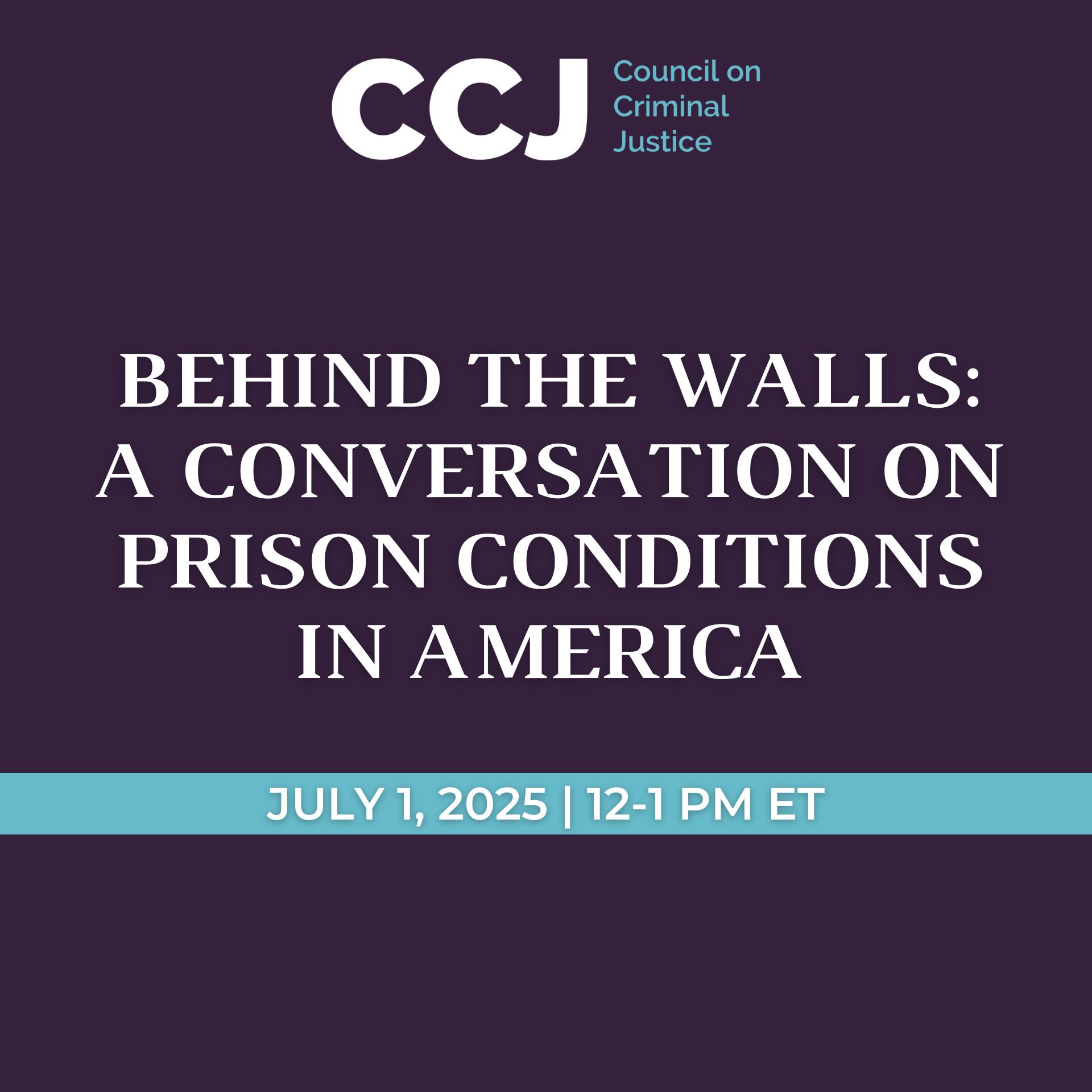CCJ panel says more timely, complete, and accurate crime data are urgently needed to help policymakers spot emerging trends, deploy appropriate interventions
FOR IMMEDIATE RELEASE
5:00 a.m. ET, June 25, 2024
Contact: Brian Edsall
bedsall@counciloncj.org
845-521-9810
WASHINGTON – Despite recent improvements, national crime data fall short of what the country needs to sufficiently understand, control, and prevent crime, the Council on Criminal Justice Crime Trends Working Group said today in a report outlining a roadmap for improvement. Calling for urgent action, the report, Better Crime Data, Better Crime Policy, presents a set of recommendations to strengthen the nation’s crime data infrastructure and better equip policymakers with timely, accurate, and usable data essential to effectively address community violence and other crime.
Composed of 16 expert producers and consumers of crime data from law enforcement, state and local government, public health, academia and the advocacy community, the Working Group said that unlike readily available data on inflation and unemployment trends, national crime data lag by many months. That delay hinders government and community leaders as they seek to spot emerging crime issues and deploy appropriate interventions, a problem that has become more serious in recent years as the internet, social media, and other technologies have fostered the rapid spread of new types of crime.
In addition, the lack of real-time national data—which crimes are rising, which are falling, and by how much—can distort public perceptions of trends and prompt changes to strategies and policies based on anecdote rather than evidence, the report said.
“Even small discrepancies can have big consequences in the policy and political environment. This is especially true when an inaccuracy makes the difference between a particular crime trend going up or down,” the Working Group said. “The potential fallout can be huge—in terms of crime tactics and strategies, whether the police chief stays on the job or gets fired, even whether the mayor or prosecutor is re-elected or driven from office. At stake are billions in government spending on public safety and criminal justice, the viability of businesses and urban centers, and the extent to which Americans are safe, and feel safe, in their homes and communities.”
The Working Group proposed action in multiple areas by federal, state, and local agencies, focusing on improvements to the timeliness, accuracy, completeness, and usability of crime data. Key recommendations in the report include:
- In partnership with the FBI, the CDC, and other federal agencies, the Bureau of Justice Statistics (BJS) should publish a comprehensive annual compendium of crime in the U.S., starting in 2025, that simultaneously reports law enforcement and victimization survey data and includes cybercrime, hate crime, securities fraud, and other important types of crime.
- BJS should begin next year publishing monthly crime statistics from a nationally representative sample of jurisdictions, similar to how the Bureau of Labor Statistics releases employment statistics on the first Friday of every month.
- The FBI should develop a plan to increase the number of law enforcement agencies reporting to the National Incident-Based Reporting System (NIBRS) to cover 90% of the U.S. population by the end of 2025 and 98% by the end of 2027, matching the level of coverage prior to the switch to NIBRS. States not already reporting monthly should enact or strengthen laws requiring local law enforcement agencies to report NIBRS-compliant crime data to state UCR programs on a monthly basis.
- The CDC should improve the health surveillance systems that collect information on violent deaths and firearms assaults and injuries by directing the National Center for Health Statistics to develop a plan to address the systematic miscoding of firearms assaults and injuries in hospital discharge coding.
- Congress should provide BJS with funds to establish a National Justice Data Analysis Center that would define national best practices for law enforcement agencies to visualize and share data, provide training and technical assistance to help agencies deploy data to improve crime analysis and prevention, and enhance crime trends data science.
To implement its recommendations, the Working Group recommended that Congress increase BJS appropriations to $75 million for FY2025, scaling up to $93 million in FY2026. In addition, the Group made several one-time and annual funding recommendations for other federal agencies, including the FBI, the Bureau of Justice Assistance (BJA), and the Centers for Disease Control and Prevention (CDC).
CCJ launched the Working Group in April 2023 to explore and explain current crime trends and recommend improvements in the nation’s capacity to produce timely, accurate, and complete crime data. The Council’s ongoing series of crime trends reports, as well as analyses on specific crime such as homicide, shoplifting, and motor vehicle theft, have become trusted sources of data for policymakers and the media. Forthcoming releases include a July report on mid-2024 crime levels as well as reports examining trends in carjacking, robbery, and other offenses.
Support for the group was provided by The Annie E. Casey Foundation, Arnold Ventures, the Harry Frank Guggenheim Foundation, Southern Company Foundation, Stand Together, and CCJ’s general operating contributors. The group was directed by John Buntin, a former journalist and former Director of Policy and Community Safety for Metropolitan Nashville-Davidson County.
Working Group Members
- John Roman (Chair), Senior Fellow and Director, Center on Public Safety and Justice, NORC at the University of Chicago
- Richard Rosenfeld (Founding Chair), Curators’ Distinguished Professor Emeritus, Dept. of Criminology and Criminal Justice, University of Missouri-St. Louis
- Alex Piquero (Senior Adviser), Professor, University of Miami; former director, Bureau of Justice Statistics
- Ruth Abaya, Senior Director, Health Systems and CVI Integration, The Health Alliance for Violence Prevention
- Thomas Abt, Founding Director, Violence Reduction Center, University of Maryland; Senior Fellow, Council on Criminal Justice
- Delrice Adams, Executive Director, Illinois Criminal Justice Information Authority
- Jeff Asher, Co-Founder, AH Datalytics
- Deborah Azrael, Director of Research, Harvard Injury Control Research Center, Harvard T. H. Chan School of Public Health
- Jamein Cunningham, Assistant Professor, University of Texas Austin, School of Law and LBJ School of Public Affairs
- Drew Evans, Superintendent, Bureau of Criminal Apprehension, Minnesota Dept. of Public Safety
- Chief Edgardo Garcia, Chief, Dallas Police Department; President, Major City Chiefs Association
- Brandon Gibson, Chief Operating Officer, State of Tennessee
- Janet Lauritsen, Curators’ Distinguished Professor Emerita, Dept. of Criminology and Criminal Justice, University of Missouri-St. Louis
- Michael Nutter, Former Mayor, City of Philadelphia; former President, U.S. Conference of Mayors
- Kathleen O’Toole, Partner, 21CP Solutions; Former Chief, Seattle Police Department
- Fernando Rejón, Executive Director, Urban Peace Institute
- Lisa Shoaf, Director, Statistical Analysis Center, Ohio Office of Criminal Justice Services
- Keon Turner, Data Analysis and Reporting Team Manager, Virginia Department of State Policing
About the Council on Criminal Justice
The Council on Criminal Justice (CCJ) is a nonpartisan invitational membership organization and think tank that advances understanding of the criminal justice policy challenges facing the nation and builds consensus for solutions based on facts, evidence, and fundamental principles of justice.



